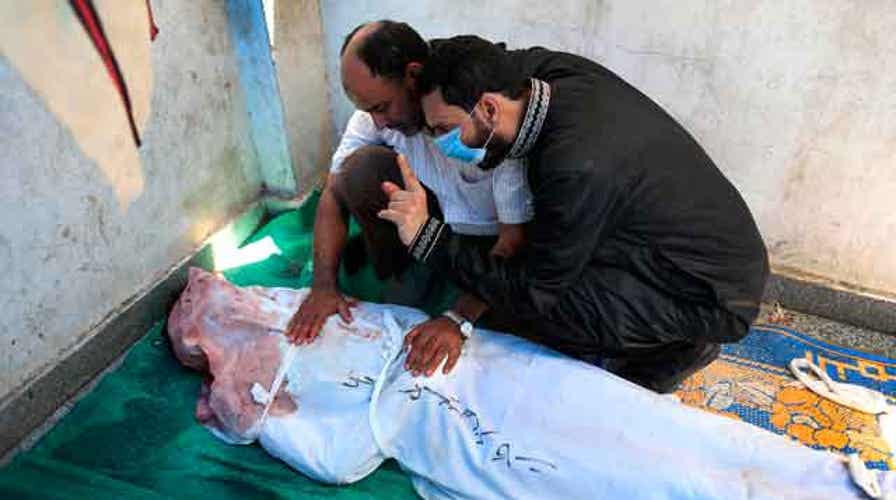Crackdown in Egypt leads to greater violence
Nadine Sherif from the Cairo Institute for Human Rights has an update on the situation in Egypt. The situation is getting worse as both sides turn to violence
Two Republican senators have gone to Egypt with the backing of President Obama to try to end the unrest and chaos that has gripped the country since the military ousted the country’s leader last month.
Sens. John McCain, of Arizona, and Lindsey Graham, of South Carolina, arrived Monday in the capital of Cairo to meet with interim leaders including President Adly Mansour and Defense Minister Gen. Abdel Fattah al-Sisi.
They arrived amid a roughly 30-day standoff between Egypt's military-backed government and protesters who support ousted President Mohammed Morsi -- a member of the Muslim Brotherhood political party.
Clashes between the rival groups have already resulted in the deaths of more than 250 Egyptians.
Thousands of Morsi supporters remain camped out in downtown Cairo, demanding the Islamist leader's reinstatement as the interim government repeatedly tells them to disperse before security forces move in -- setting the stage for potentially more violent showdowns.
Neither senator has so far publicly commented on the unannounced trip, though both are experienced in foreign policy and diplomacy.
McCain, a retired Navy officer and member of the Senate Foreign Relations Committee, in late spring made a surprise trip to Syria, where opponents are trying to overthrow the regime of President Bashar al-Assad.
In a recent interview, McCain said his and Graham’s positions as elected leaders have forged relationships with many Egyptians.
Graham is a member of the Senate Armed Services Committee and a former Air Force lawyer.
They arrived with the U.S. Embassy in Egypt closed amid a terror threat and more than 1,000 pro-Morsi supporters marching Monday through Cairo.
Meanwhile, U.S. Deputy Secretary of State William Burns also is in Egypt as part of U.S. mediation efforts.
White House Press Secretary Jay Carney said McCain and Graham are representing “the United States Congress” while Burns represents the administration.
However, he allowed the senators “have certainly been in conversations with the president and others on the president’s national security team” and that their efforts in Egypt “represent the broad interests” of both the administration and Congress.
Burns, joined by a small delegation of international officials, also met with interim government leaders and Khairat el-Shater, the powerful deputy leader of the Muslim Brotherhood. The el-Shater talks are reportedly taking place in the prison where he is being held.
El-Shater was among several prominent Islamists arrested by authorities after the army ousted Morsi on July 3.
He has been charged with complicity in the killing of anti-Morsi protesters during the four days of protests that led up to the military coup.
State Department spokeswoman Marie Harf on Monday repeated the administration’s position -- that the U.S. is not taking sides but the Muslim Brotherhood should be part of the “inclusive Democratic process.”
Morsi is being held at an undisclosed location and faces accusations of conspiring with the militant Palestinian Hamas group to escape prison in 2011.
El-Shater and five others are to go on trial on Aug. 25 on charges related to the killing of eight protesters outside the Brotherhood's Cairo headquarters during the mass protests leading up to Morsi’s ouster.
U.S. officials have not called his removal a coup because that would require them to cut off aid, $1.3 billion annually to Egypt, an essential Western ally in Middle East peace keeping.
Amid the U.S. visits, the Brotherhood issued a statement saying Morsi remains the legitimately elected president and that envoys should speak only to him. However, the group did not condemn the Burns visit.
The visits also follow Egypt's highest security body, led by the interim president and some top Cabinet ministers, announcing that the timeframe for any negotiated resolution to the current standoff should be "defined and limited."
It also called on the pro-Morsi protesters to abandon their sit-ins and join the political road map announced the day of the coup.
With the Islamist-backed constitution adopted last year suspended and the legislature dominated by Morsi's supporters dissolved, the road map provides for a new or an amended constitution to be put to a national referendum later this year and presidential and parliamentary elections early in 2014.
A Mansour spokesman said not a "single step" of the road map would be changed and ruled out a referendum on the transition plan. His comments appeared designed to debunk speculation that the flurry of diplomatic visits is likely to persuade Egypt's interim government to offer substantive concessions to Morsi's supporters in return for an end to the sit-in protests.
Fox News' Mike Emanuel and the Associated Press contributed to this report.





